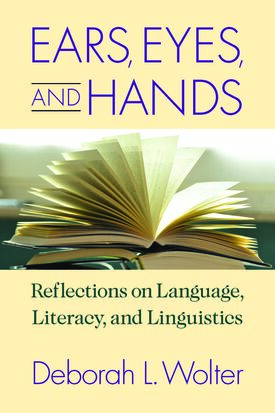
Ears, Eyes, and Hands
Reflections on Language, Literacy, and Linguistics
In short, engaging narratives, a deaf literacy specialist reveals the attitudes and assumptions in the educational system regarding race, ethnicity, economic status, gender, and disability.
Description
Ears, Eyes, and Hands presents the author’s reflections on language, literacy, and linguistics that have been shaped by her deafness and by her work as an educator. In short, engaging narratives, Deborah L. Wolter exposes deeply entrenched attitudes and stereotypes regarding language, bringing to bear her own experiences as a deaf person as well as her interactions with children from varying backgrounds.
Wolter reveals and rectifies the impact of deficit mindsets in the educational system regarding race, ethnicity, economic status, gender, and disability. As a literacy specialist, she works with students who fall through the cracks in a system that strives to embrace the diverse backgrounds and abilities found in the classroom. Her passion for engaging students and cultivating literacy shines in the stories she tells, which serve as parables that allow readers to evaluate their own attitudes and assumptions. Educators, parents, and community members will benefit from Wolter’s examination of sociolinguistics and language privilege as she identifies how ethnocentrism and ableism are contributing to negative educational outcomes for some students. With humor and warmth, she offers a path toward approaching language and listening as a gateway to connection and understanding, both inside the classroom and beyond.
Deborah L. Wolter is a literacy consultant for Student Intervention and Support Services in the Ann Arbor Public Schools in Michigan.
Reviews
"Wolter’s introspective and retrospective approach through storytelling forces the reader to rethink human communication and to consider the complexities of literacy for all people (e.g. d/Deaf, hard-of hearing, hearing)...Perhaps the most imperative aspect of the book is when Wolter demonstrates how disability is associated with deviance and the forcing of students who are differently abled to fit into narrowly defined roles of what it means to be “good” and “listen.” By doing this her thoughts align with a disability studies perspective, challenging notions of what it means to be “normal” in an intersectionally diverse society."
— Adai A. Tefera and Mary L. Johnson, Education Review
"Wolter stresses the importance of learning from, listening to, and accepting all people with regards to communication, education, and their individual needs for success. This is not a book about educating DHH children—it is a book about educating all children...There is an abundance of applicable information to support deep discussion and within a formal setting, where structured exploration of realistic educational experiences and challenges in the field could be contextualized while providing an opportunity for reflecting on how to overcome these challenges to move forward."
— Michella Maiorana-Basas, Journal of Deaf Studies and Deaf Education
Advance Praise
“A wise and warm book about a life lived at the intersection of the hearing and deaf worlds, about noticing the nuances of language and literacy, and most urgently, about the importance of listening.”
— Lydia Denworth, author of "I Can Hear You Whisper: An Intimate Journey Through the Science of Sound and Language"
“Deborah Wolter interweaves her experiences as a deaf person with stories of her students who struggle to understand the written word. In between these storylines are implied lessons about how we all could do a better job listening to one another. Wolter attends to context, cultural differences, and body language, picking up on unsaid things that carry deep meaning. I found Ears, Eyes, and Hands to be a fascinating consideration of what is gained when communication cuts through the noise.”